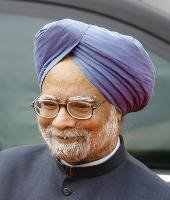NEW DELHI -- Last week's visit to India by Burma's military ruler, Gen. Than Shwe, during which several bilateral agreements and treaties were signed, highlighted the tensions in New Delhi's policy toward the isolated Southeast Asian country. The red carpet welcome that New Delhi accorded to Than sparked protests by Burmese refugees, who in addition to denouncing Than as a murderer and dictator, argued that a democratic Burma would better serve India's strategic interests.
India once openly supported the Burmese democracy movement led by Aung San Suu Kyi. But in the 1990s, it changed course and stepped up engagement with the military junta based on strategic interests. Almost two decades later, according to many analysts, New Delhi has not achieved any of its three main strategic goals in Burma.
Åshild Kolås, of the Peace Research Institute in Oslo, identified India's primary interests with regard to Burma as increasing security in the border regions "through generous military assistance and agreements on counterinsurgency cooperation," promoting New Delhi's "Look East policy" by "building overland transportation routes from northeast India to Southeast Asia and the Bay of Bengal," and finally, "countering Chinese influence."

